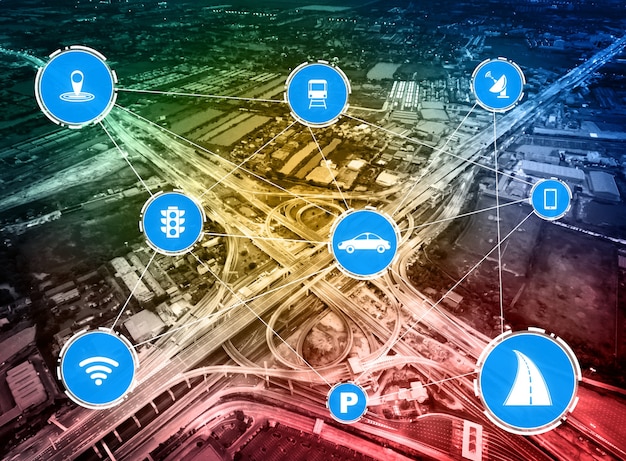How 2025 Smart City Standards Will Reshape Infrastructure Approvals

The updated 2025 National Smart City Standards will significantly impact infrastructure project approvals by prioritizing sustainability, technological integration, and data-driven decision-making, leading to more efficient, resilient, and citizen-centric urban development initiatives.
The landscape of urban development is on the cusp of a significant transformation. Understanding how will the updated 2025 National Smart City Standards impact infrastructure project approvals? becomes crucial for stakeholders navigating the future of urban planning. These standards are poised to redefine how cities approach infrastructure, emphasizing innovation and sustainability.
Understanding the Evolution of Smart City Standards
Smart city standards have evolved significantly over the past decade, driven by technological advancements and the growing need for sustainable urban development. These standards provide a framework for cities to integrate technology and data to improve services and quality of life.
Key Milestones in Smart City Development
The journey towards standardized smart city development has been marked by several key milestones. From initial pilot projects to comprehensive national frameworks, cities have gradually embraced the potential of smart technologies.
Early adopters focused on specific areas like traffic management and energy efficiency, while more recent initiatives aim for holistic integration across all city functions. This evolution reflects a growing understanding of the interconnectedness of urban systems.
- Early adoption of IoT devices for basic monitoring.
- Development of city-wide data platforms.
- Implementation of smart grids for energy management.
- Focus on citizen engagement through digital platforms.
Ultimately, understanding these milestones is key to prepare any infrastructure project to make it suitable for the updated demands.

The Core Principles of the 2025 National Smart City Standards
The 2025 National Smart City Standards are built upon a foundation of core principles that guide the planning, development, and implementation of smart city initiatives. These principles ensure that projects align with national objectives and contribute to a sustainable and resilient urban environment.
Sustainability and Resilience
Sustainability and resilience are at the heart of the 2025 standards. Infrastructure projects must demonstrate a commitment to minimizing environmental impact and enhancing the city’s ability to withstand disruptions.
This involves incorporating green building practices, promoting renewable energy sources, and developing robust disaster preparedness plans. The goal is to create cities that are not only efficient but also environmentally responsible and adaptable to change.
Moreover, the design and planning process need to be aligned with sustainability and resilience guidelines to get approval.
Technological Integration and Data-Driven Decision-Making
The 2025 standards emphasize the importance of technology and data in driving smart city initiatives. Infrastructure projects must leverage advanced technologies to collect, analyze, and utilize data for informed decision-making.
This includes deploying sensors, establishing data analytics platforms, and implementing cybersecurity measures. The aim is to create a data-rich environment that enables cities to optimize resource allocation, improve service delivery, and enhance citizen engagement.
How Standards Impact Infrastructure Project Approvals
The updated 2025 National Smart City Standards will have a profound impact on how infrastructure projects are evaluated and approved. Projects will now be assessed not only on their technical merits but also on their alignment with smart city principles and objectives.
This shift will require project developers to adopt a more holistic approach, considering the broader implications of their work on the urban environment and the quality of life of citizens.
- Prioritization of projects that align with smart city goals.
- Increased scrutiny of environmental impact assessments.
- Emphasis on community engagement and stakeholder collaboration.
Projects that demonstrate a clear commitment to sustainability, technological innovation, and data-driven decision-making will be more likely to receive approval and support.
Key Changes in the Approval Process
Several key changes are expected in the infrastructure project approval process as a result of the 2025 National Smart City Standards. These changes reflect a move towards a more transparent, data-driven, and citizen-centric approach.
Enhanced Data Requirements and Transparency
Project developers will be required to provide more comprehensive data on the environmental, social, and economic impacts of their proposed infrastructure. This data will be used to assess the project’s alignment with smart city objectives and to ensure that it delivers tangible benefits to the community.
Increased transparency will also be a key feature of the approval process, with project information being made available to the public through online portals and community forums. This will allow citizens to provide feedback and participate in the decision-making process.
Integration of Smart City Metrics and KPIs
The 2025 standards will introduce a set of smart city metrics and key performance indicators (KPIs) that will be used to evaluate the success of infrastructure projects. These metrics will cover areas such as energy efficiency, water conservation, waste reduction, and traffic congestion.
Projects will be assessed based on their ability to meet these KPIs and contribute to the overall goals of the smart city. This will incentivize developers to incorporate innovative technologies and sustainable practices into their designs.
Challenges in Implementing the New Standards
Implementing the updated 2025 National Smart City Standards will not be without its challenges. Cities will need to address a range of issues, including funding constraints, technological barriers, and workforce development needs.
Overcoming these challenges will require collaboration between government, industry, and academia, as well as a commitment to long-term planning and investment.

Funding and Resource Allocation
Securing adequate funding for smart city projects will be a major challenge for many cities. The costs of implementing new technologies and infrastructure can be substantial, and cities may need to explore innovative financing mechanisms, such as public-private partnerships and green bonds.
Technological and Data Infrastructure
The successful implementation of smart city standards depends on the availability of robust technological and data infrastructure. Cities will need to invest in high-speed internet, data centers, and cybersecurity measures to support their smart city initiatives.
Best Practices for Future Infrastructure Projects
To ensure that future infrastructure projects meet the requirements of the 2025 National Smart City Standards and contribute to the creation of sustainable and resilient urban environments, project developers and city planners can adopt the following best practices:
- Engage stakeholders early in the planning process.
- Incorporate sustainability and resilience into project design.
- Leverage data and technology for informed decision-making.
- Ensure cybersecurity and data privacy.
By adhering to these best practices, cities can pave the way for a smarter, more sustainable future.
| Key Point | Brief Description |
|---|---|
| 💡 Sustainability Emphasis | Projects must prioritize environmental responsibility and resilience. |
| 📊 Data-Driven Decisions | Use data for informed decisions with robust analytics. |
| 🏙️Citizen-Centric Design | Engage citizens and stakeholders early. |
| 🌐 Tech Integration | Incorporate advanced technologies for efficiency. |
FAQ
▼
The 2025 National Smart City Standards are updated guidelines that emphasize integrating technology and sustainability into urban infrastructure projects, promoting efficient and citizen-centric city development.
▼
The standards will require projects to demonstrate a commitment to sustainability, technological integration, and data-driven decision-making to gain approval, ensuring alignment with smart city goals.
▼
Core principles include sustainability, resilience, technological integration, and data-driven decision-making, all aimed at creating more efficient, environmentally responsible, and adaptable urban environments.
▼
Cities may face funding constraints, technological barriers, data privacy concerns, and workforce development needs as they strive to implement the 2025 National Smart City Standards.
▼
Projects should engage stakeholders early, incorporate sustainability and resilience, leverage data for decision-making, and ensure cybersecurity to align with the 2025 National Smart City Standards.
Conclusion
As cities across the US prepare for the implementation of the updated 2025 National Smart City Standards, understanding how will the updated 2025 National Smart City Standards impact infrastructure project approvals? is paramount. By embracing sustainability, prioritizing technological innovation, and engaging citizens, cities can pave the way for a smarter, more resilient, and citizen-centric urban future.





